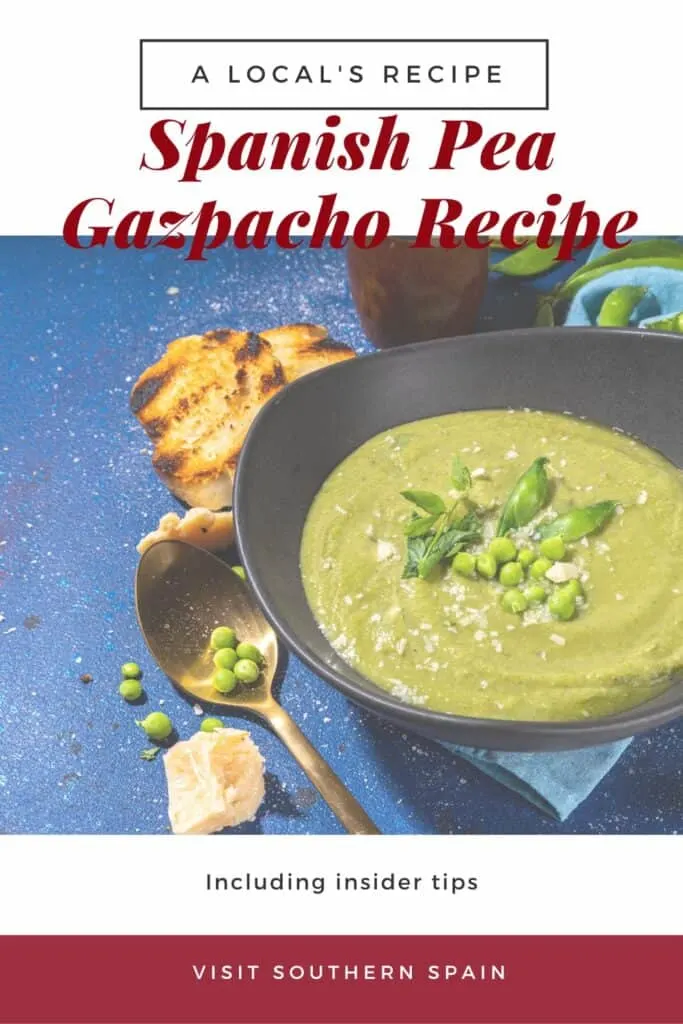You know that whenever you are looking for summer gazpacho recipes, this is the right place to come.
In this case, if you want to switch things up from the easy tomato gazpacho, you should make our pea gazpacho, still simple to make but a whole different experience flavor-wise.
Keep reading this article and you will find everything you need to prepare and nail this cold Spanish soup recipe.
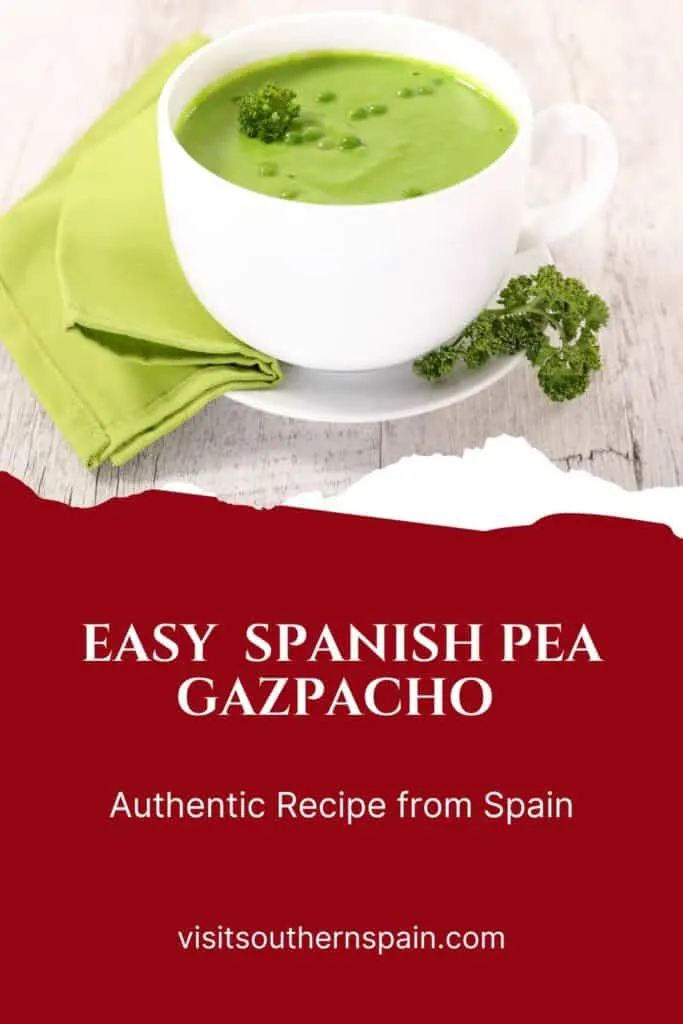
You, dear reader, support this blog. If you purchase through a link, we earn a small commission. As an Amazon Affiliate, we earn from qualifying purchases.
Pssst…!!?? You can’t get enough of “gazpacho”? Have a look at my other posts:
Background of the Dish
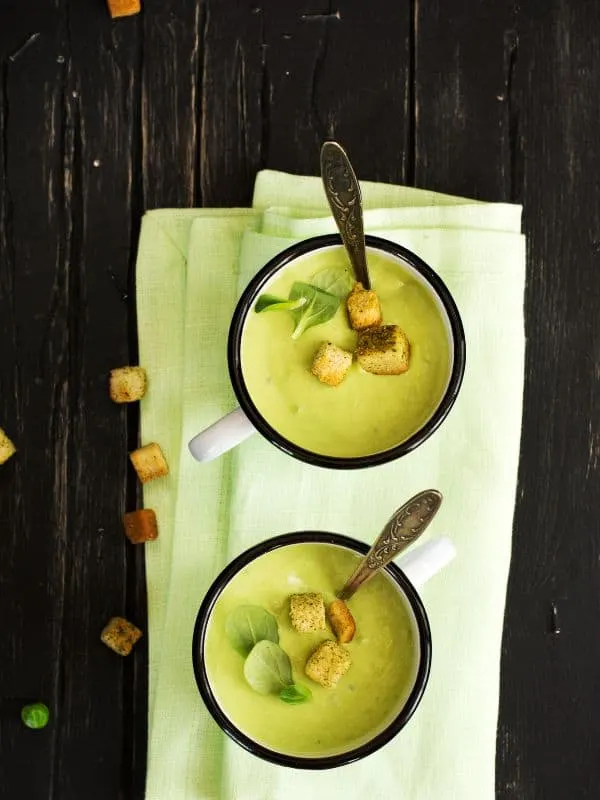
Spanish cold soups go all the way back to the 1600s, when the first tomato gazpacho recipe was created (and later documented).
They quickly became a staple recipe in Andalusian cuisine, and you can’t go anywhere in that region without finding at least one place that sells it.
The pea gazpacho is an alternative version to the classic one, and it is a perfect blend of different green ingredients, like peas, spring onion, and green bell peppers.
Pin for later!
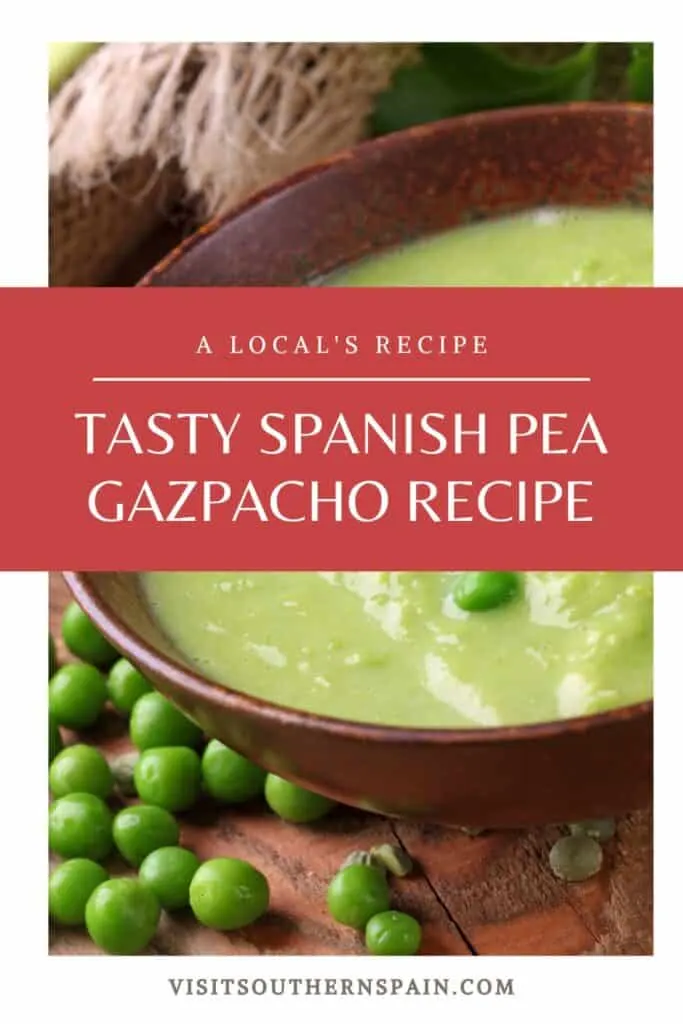
Things You’ll Need for Pea Gazpacho
To make the pea gazpacho you will need peas (fresh or frozen), spring onion, garlic cloves, green bell pepper, and olive oil as the main ingredients.
Besides that, a food processor or a blender will also be necessary to prepare this dish.
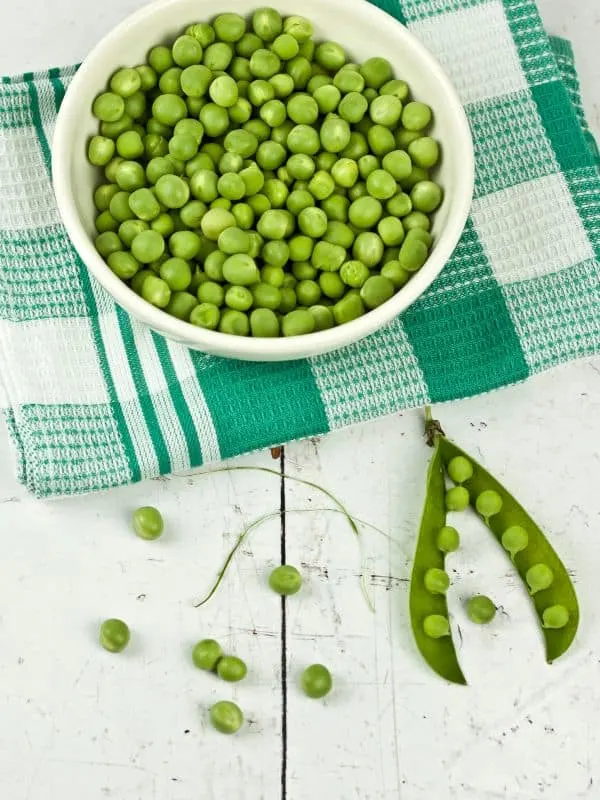
Ingredients
- 500g fresh or frozen green peas
- 1 cucumber
- 1 green bell pepper
- 2 spring onions
- 2 garlic cloves
- 1/4 cup fresh parsley leaves
- 3 cups (750ml)vegetable broth or water
- 1/4 cup (60ml) extra-virgin olive oil
- 3 tablespoons white wine vinegar
- Juice of 1 lemon
- Salt and pepper to taste
How to Make Pea Gazpacho – Step by Step Guide
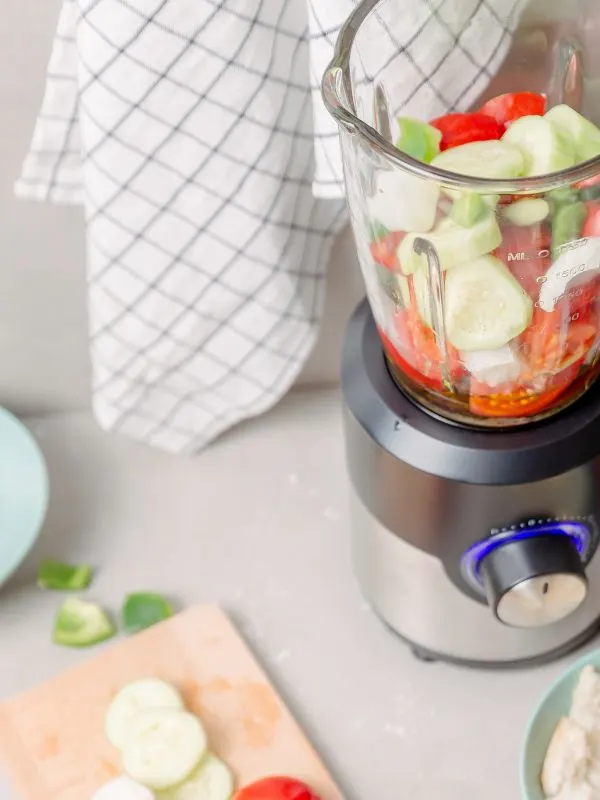
- The first step depends on the type of pea that you are using. For fresh peas, blanch them in boiling water for 2 to 3 minutes, then transfer them to an ice bath to cool down quickly. For frozen peas, follow the package instructions to cook them until tender. Drain and set aside.
- As you cook the peas, prepare all of the raw vegetables listed for this pea gazpacho recipe. Wash, peel, and chop the cucumber and bell pepper (remove the seeds). Also, peel and mince the garlic, and chop the spring onion.
- Now grab a blender or a food processor, combine the cooked peas, cucumber, green bell pepper, chopped spring onions, minced garlic, and fresh parsley leaves. Blend until you get a smooth consistency.
- Then gradually add the vegetable broth or water to the blender while blending the mixture. Continue until the pea gazpacho reaches the desired consistency.
- With the blender still running, drizzle in the extra-virgin olive oil and white wine vinegar. Add the lemon juice as well. Blend until everything is well combined and the pea soup is smooth.
- After that, taste the pea gazpacho and season with salt and pepper to your preference. Adjust the vinegar or lemon juice if you want a more tangy flavor.
- Then transfer the soup to a large bowl and refrigerate for at least 2 hours before serving. Chilling the vegetable gazpacho will enhance its flavors and make it more refreshing.
- Once you are ready to serve, stir the cold green pea soup for a bit and pour it into small bowls or plates for serving. You can also serve it as a gazpacho shot in small glasses.
Substitution of Ingredients
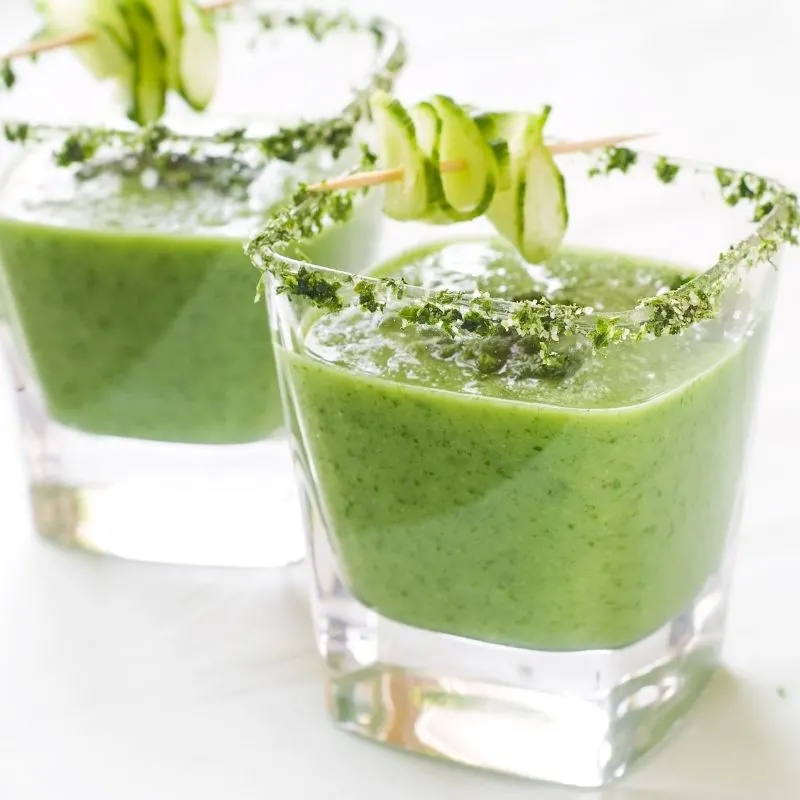
Something that we love about this gazpacho is that it can be a frozen pea soup or a fresh green pea soup, and there are other ingredients substitutions that you can put to the test.
For example, play with the vegetables of this summer gazpacho recipe as much as you like (we recommend sticking to green or white ones to keep the color).
For an extra kick, you can season the pea gazpacho with 1 teaspoon of paprika or 1/2 teaspoon of chili flakes.
This is a healthy gazpacho, but if you don’t mind adding some calories then stir in 1/2 cup of heavy cream for extra creaminess in your soup.
If you are missing the classic flavor of the chilled tomato gazpacho, then you can mix this recipe with the green tomato gazpacho or the gazpacho verde one.
Tips on Serving Pea Gazpacho
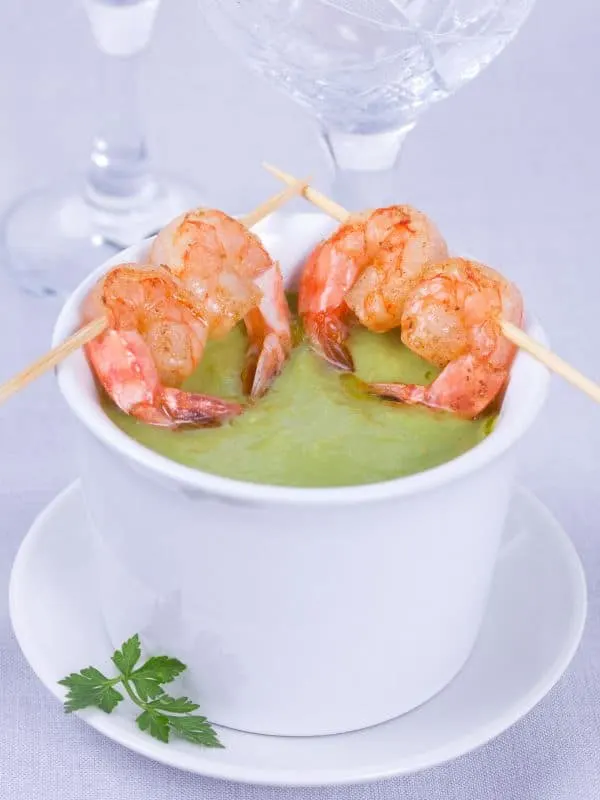
The pea gazpacho is the perfect one if you are looking for a cold soup that can be served as a main dish, as a side one, or as an appetizer.
To serve this pea gazpacho as a main dish we recommend adding some toppings, like chopped nuts, manchego cheese cubes, serrano ham slices, or cooked bacon.
For a gazpacho appetizer, you can serve it in small bowls with some shrimp on top and some shredded parmesan cheese goes great with it.
Lastly, you can make a full-Andalusian tapas table and serve this as cold soup shots, they go really well paired with other gazpachos like the corn gazpacho or the tomato basil gazpacho.
How to Store Pea Gazpacho
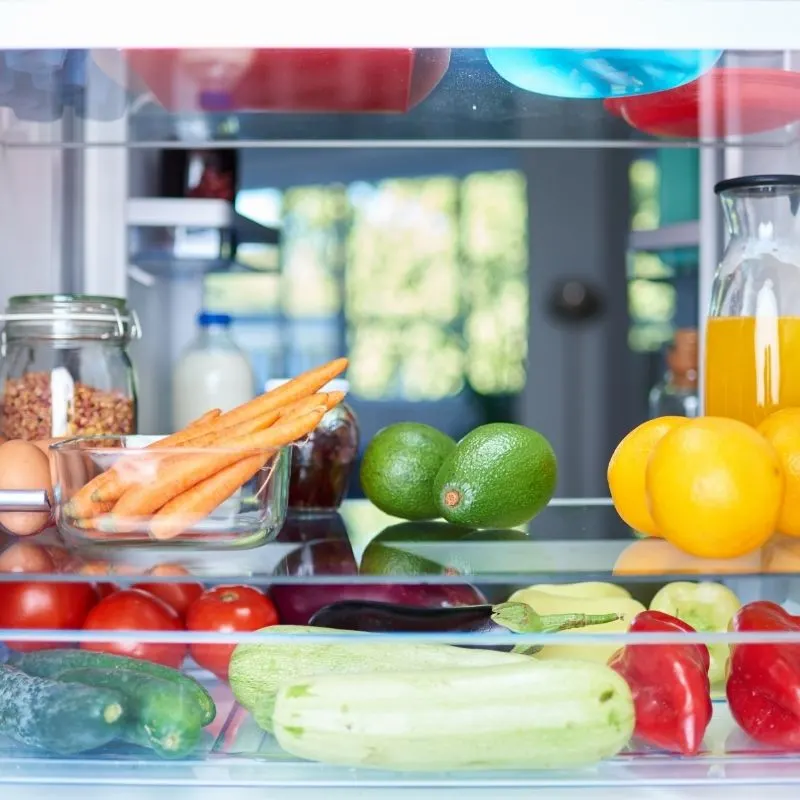
Similar to other Spanish gazpacho recipes, like the cold cauliflower soup or the cold asparagus soup, this one has the advantage that you can both freeze it or store it in the fridge.
In both cases, place the pea gazpacho in a covered container, better if you cover it with plastic wrap in contact with the top of the soup (so it doesn’t form a crust).
Then you can place the cold pea soup in the fridge for up to 3 days, or in the freezer for up to 30 days.
To thaw the pea gazpacho, just take it to the fridge overnight and it will be ready.
Remember to stir the green pea gazpacho for a bit before serving, so all of the ingredients get mixed together again.
Recipe Card: Pea Gazpacho
Easy Pea Gazpacho Recipe
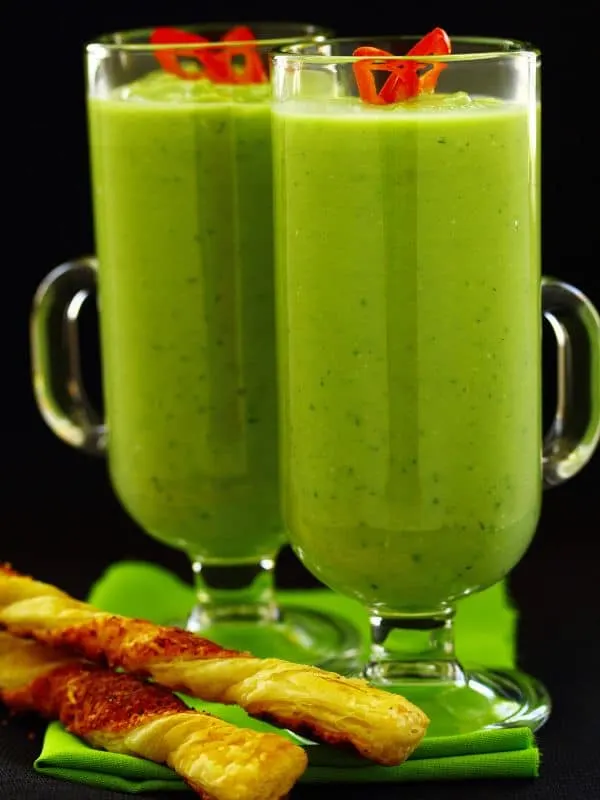
You know that whenever you are looking for summer gazpacho recipes, this is the right place to come.
In this case, if you want to switch things up from the easy tomato gazpacho, you should make our pea gazpacho, still simple to make but a whole different experience flavor-wise.
Keep reading this article and you will find everything you need to prepare and nail the pea gazpacho recipe.
Ingredients
- 500g fresh or frozen green peas
- 1 cucumber
- 1 green bell pepper
- 2 spring onions
- 2 garlic cloves
- 1/4 cup fresh parsley leaves
- 3 cups (750ml)vegetable broth or water
- 1/4 cup (60ml) extra-virgin olive oil
- 3 tablespoons white wine vinegar
- Juice of 1 lemon
- Salt and pepper to taste
Instructions
- If using fresh peas, blanch them in boiling water for 2 to 3 minutes, then transfer them to an ice bath to cool down quickly and retain their vibrant green color. If using frozen peas, follow the package instructions to cook them until tender. Drain and set aside.
- As you cook the peas, prepare the raw vegetables. Wash, peel, and chop the cucumber and bell pepper (remove the seeds). Also, peel and mince the garlic, and chop the spring onion.
- In a blender or food processor, combine the cooked peas, cucumber, green bell pepper, chopped spring onions, minced garlic, and fresh parsley leaves. Blend until you get a smooth consistency.
- Gradually add the vegetable broth or water to the blender while blending the mixture. Continue until the pea gazpacho reaches the desired consistency.
- With the blender running, drizzle in the extra-virgin olive oil and white wine vinegar. Add the lemon juice as well. Blend until everything is well combined and the soup is smooth.
- Taste the fresh pea soup and season with salt and pepper according to your preference. Adjust the vinegar or lemon juice if you want a more tangy flavor.
- Transfer the Spanish pea soup to a large bowl and refrigerate for at least 2 hours before serving.
- When ready to serve, stir the chilled pea soup for a bit and pour it into small bowls or plates for serving.
Notes
To take this cold green soup you can stir in 1/2 cup of heavy cream or a few tablespoons of cream cheese.
If you don't want to serve it in small bowls or plates, you can serve it as gazpacho shots (a smaller amount, perfect for tapas).
Nutrition Information
Yield
6Serving Size
1Amount Per Serving Calories 168Total Fat 9.6gSaturated Fat 1.3gCholesterol 0mgSodium 390mgCarbohydrates 16.8gFiber 5gSugar 7.1gProtein 7.8g

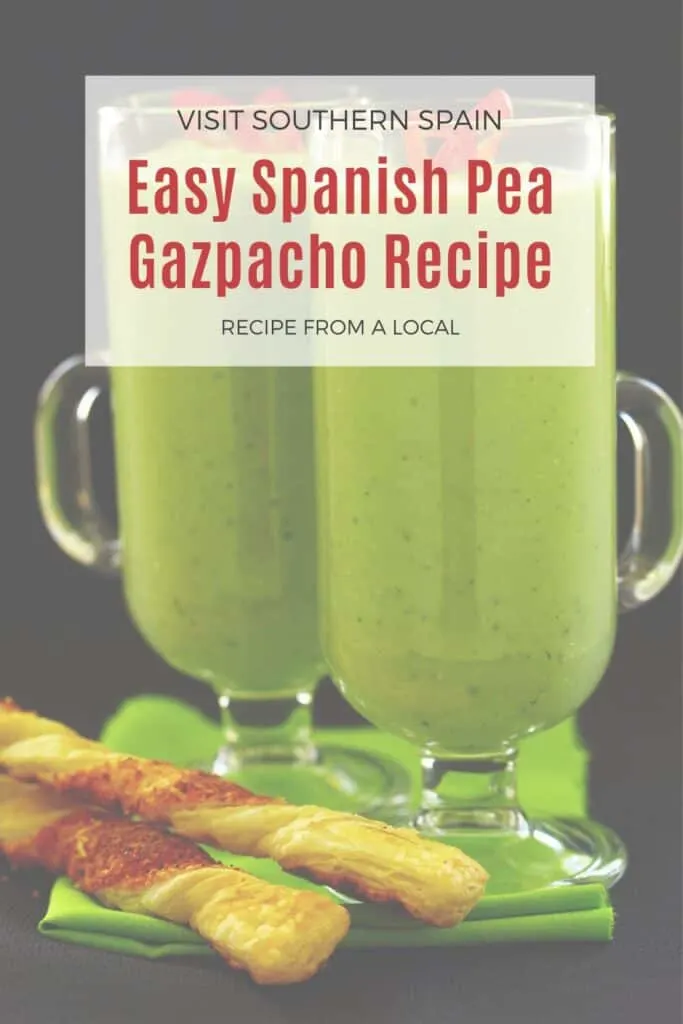

Hola, I’m Paulina! Together with my team, we are passionate about Southern Spain. Here we share all you need to know for great times in Southern Spain with the best places to visit, stay and, of course, the best food to eat.
Let’s dive in and explore Southern Spain’s outdoors, food and culture con pasión!

